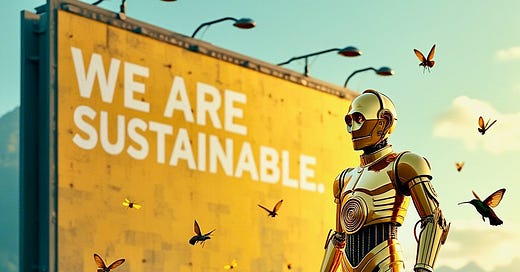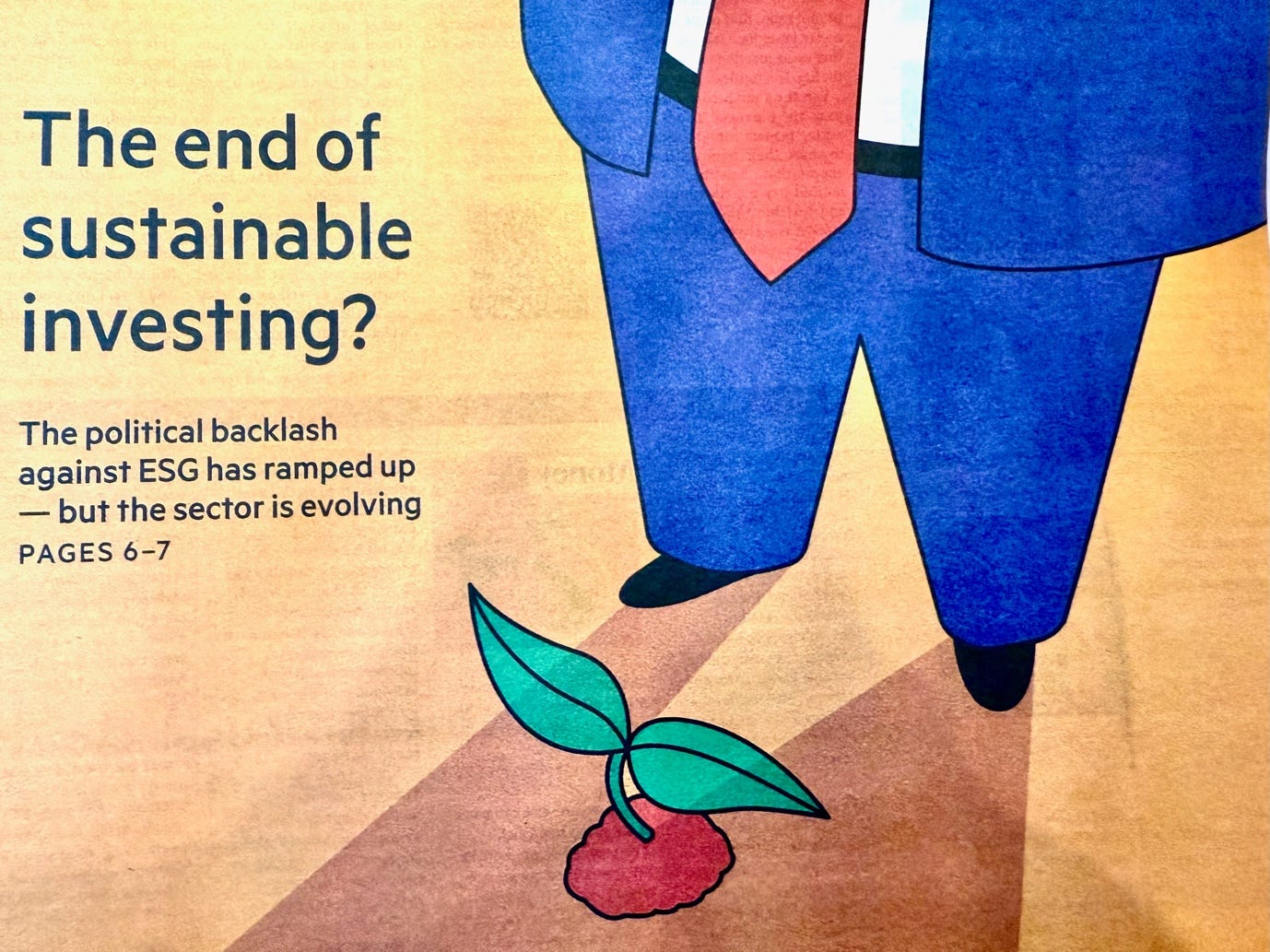One of my favorite times in any week when I’m not traveling is reading the Saturday Financial Times over a several cups of coffee. Once again, today’s pink pages were spilling over with relevant stories, among other things noting how reinsurers are trying to protect themselves from fire disasters like the one that has just ripped through “Lost Angeles,” and how EU automakers could end up having to pay hundreds of millions of euros to Chinese electric car manufacturers—to buy carbon credits to avoid 2025 pollution rules set by Brussels.
Whatever Team Trump may choose to believe, the sustainability agenda is already reshaping markets, powerfully. But the piece that really blew me away this morning was featured on the front cover of the Money section—and titled “The End of Sustainable Investing?” Even for those wanting downtime over this weekend, consider this a must-read.
Apart from anything else, it resonates deeply with a theme that has been playing through my brain for some time—and which is at the heart of this evolving series of Substack posts. Distilled into a single question, it runs as follows:
“What must the Sustainability Industry now do to ensure that it is future-fit for the 2030s and beyond?”
It’s a subject I am due to cover in a number of upcoming podcasts (including one with Oxygen Conservation next week), fireside chats (including one with Datamaran, next week) and executive committee briefings, including one in France, also next week, with EcoVadis.
A key part of the answer: we must expand our focus, looking way beyond individual companies and their boards, brands, business models and supply chains. This approach is doomed to fail if we do not adequately address the market dynamics that so powerfully shape corporate thinking and priorities. I covered elements of this theme in a recent post, “Corporate Filings and Market Magnetism.”
End of the beginning?
So, what do Alice Ross and the FT have to say on the possible end of sustainable investing under the incoming “Trump 2.0” regime? Key points include the following:
· The sustainability investing sector continues to attract funds. As the FT puts it, “... money continues to flow into sustainable funds, with a further global net inflow of $10.4bn in the third quarter of 2024, according to data from Morningstar.”
· That said, we should now expect “greater focus on the energy transition, better regulation, and less virtual signalling”
· The necessary clean-up is already well under way. The FT again, “...regulation is clamping down on greenwashing and funds are being forced to explain more clearly to investors what they are trying to achieve.”
· The term ESG is increasingly contested. The problem is that “...the term ESG has been weaponised and is confusing for investors. That means that ESG as a synonym for sustainable investment is likely to die away, but the trend itself—in its revamped form—will continue.”
· Financial underperformance, because of under-weighting in eg., oil stocks, has been an important factor in denting the ESG sector, alongside Republicans threatening banks and other US corporates with legal action. But the FTnotes that, “...the reason in Europe to be wary of the term ESG is less a reaction to the US political climate and more due to the fact it was never that clear in the first place.”
· In the UK, meanwhile, under new rules from the Financial Conduct Authority due to launch imminently, and known as sustainability disclosure requirements (SDR), any fund wanting to call itself “sustainable” must use one of four labels.
o “Sustainability focus” funds will those that mainly invest in assets such as solar or wind energy.
o “Sustainability improver” funds will embrace those that are focused more on companies on a credible path to net zero.
o “Sustainability impact” funds will be those investing in solutions to problems such as renewable energy generation.
o And “Sustainable mixed goals” funds will invest in a mix of all three of the above areas.
· New regimes like this are expected to significantly shrink the number of UK “sustainable” funds, according to Morningstar’s head of research, Hortense Bioy. As quoted by the FT, she predicts that “from a recent universe of about 400 funds there will be a maximum of just 150 in a year’s time.”
My conclusion is that we are seeing not so much the beginning of the end of sustainability as a strategic factor in business and markets but, as Churchill once memorably put it, “the end of the beginning.”
Next: nature and biodiversity
One finding in the FT Money piece aligns particularly well with our thinking at Volans. “Sustainable investors are also moving beyond just using carbon emissions as a metric,” we are told. “There is more interest in biodiversity and natural capital—the value of assets in nature such as protection from soil erosion and flood risk, or habitats for wildlife.”
Compared to the relative under-performance of ESG funds, “Assets in open-ended biodiversity funds and ETFs have more than doubled in the past three years, though they remain a sliver of the climate fund market, according to Morningstar.”
So, why is this happening? Well, one reason seems to be that related themes “feel more tangible to a lot of our clients” than do carbon emissions, according to Stephen Metcalf, head of sustainable investing for RBC Wealth Management, also quoted in the article. He also comments: “I think it’s not really understood very well across the industry how big [an impact] nature risk will have on the value of investments over the long term.”
Growth, again
Such trends have been bubbling under for quite some time but now seem to be erupting all around us. Then, on the Opinion page of today’s Financial Times, there is a fascinating article by Daniel Susskind, an economist at both Oxford University and King’s College London, and the author of Growth: A Reckoning. I really enjoyed the book last year. As he sums up the current debate on his personal website:
“Over the past two centuries, economic growth has freed billions from poverty and made our lives far healthier and longer. As a result, the unfettered pursuit of growth defines economic life around the world. Yet this prosperity has come at an enormous price: deepening inequalities, destabilizing technologies, environmental destruction and climate change.
“Confusion reigns. For many, in our era of anaemic economic progress, the worry is slowing growth—in the UK, Europe, China and elsewhere. Others understandably claim, given its costs, that the only way forward is through “degrowth”, deliberating shrinking our economies.’
When I introduced the term “green growth” back in 1986 and ensured that when we launched SustainAbility the following year it was pitched as “The Green Growth Company,” it was because I had concluded that our collective challenge was to progressively shut down the unsustainable parts of the global economy—while supercharging the more sustainable parts. I still believe that, even though the degrowth movement has gained growing (sic) traction in recent years.
A provocative short video on related themes by Triodos Bank chief Economist Hans Stegeman can be found here. Highly recommended. Alongside that perspective, I also suggest re-reading the concluding paragraph of Daniel Susskind’s Opinion piece, already quoted above:
Three hundred years ago, Britain thundered ahead of its rivals because a fresh spirit took hold—risk-taking—entrepreneurial, aggressive in discovering new ideas about the world, single-minded in putting them into practical use.
It’s time to rewild sustainability
With the UK Government desperate to get the country back onto some form of growth track, it faces the growing threats of, firstly, being squeezed by a China anxious to dump green tech that it can’t sell to the US in European markets, and secondly of being treated more harshly by a US now supercharged by a tech sector that is set to transform the global economy pretty much as steam did back in the first Industrial Revolution, which Britain dominated.
The implications of the “tech bro” takeover of the US government is discussed by Caroline Cadwalladr here. Terrifying. And all of that is even before we get to the question of how we mark the tenth anniversary next year of the self-inflicted and still-suppurating wound of Brexit...
In any event, as I have already mentioned elsewhere, sustainability currently represents perhaps our biggest market failure to date, but in the coming years and decades it looks set to become the biggest driver of market change and, yes, growth.
Given that the world has lost 73% of its wildlife in the half century that I have been involved in this space, I see my ultimate goal in what comes next as helping embed the true longer term interests of nature and the planet in critical decisions about the future of the economy.
The grown-ups in the room
My touchstone, twenty-four years on, is still the cartoon I developed back in 1991 with the Financial Times cartoonist, Ingram Pinn. I have used it before in this series, but do so again because it so neatly sums up how I see the corporate side of our challenge.
The robot on the right-hand side of the boardroom table, originally included as a symbol of the deep future, is now an everyday consideration with the rapid evolution of AI. Still, if I were doing this again, I would include boardroom windows and, outside and looming, visual representations of the market convulsions now coming our way.
In an advisory board session this week with the US-based Smart Surfaces Coalition, part of the discussion revolved around how to what this week’s Economist chooses to call The Trump Doctrine. In essence, we were saying that at a time when ideology is running (literally) riot, the sustainability industry needs to focus on accurate data, trustworthy forecasts and outcomes that benefit ordinary citizens in today’s world, including jobs and (sometimes) tourism.
It’s time, in short, to be the grown-ups in the room, whether that be the boardroom or the cabinet room
Let me end with the final line of Susskind’s Opinion piece today, referencing again that spirit of risk-taking, “entrepreneurial, aggressive in discovering new ideas about the world, single-minded in putting them into practical use.” “It is,” he says, “that spirit we need to nurture once again.”
The central question for us all, must be now how the evolving sustainability agenda can play into (and powerfully shape and inform) the intensifying debate about tomorrow’s growth technologies and markets. In headlines, how can we ensure that given businesses, sectors and economies are responsible, resilient and regenerative parts of the future evolution of wealth creation?
John Elkington is Founder & Chief Pollinator at Volans. His personal website can be accessed here.
Available on Amazon and through good bookshops.
What readers say:
“John is a legend. Throughout my 30-year career in sustainability leadership, he has been a source of insight and inspiration. By extension he has influenced the thinking of thousands of senior executives on our programmes.
This book offers a wonderful and personal reflection on the evolution of the sustainability movement and glimpses of what might be to come.”
DAME POLLY COURTICE, founding director, Cambridge Institute for Sustainability Leadership (CISL)








